India’s Edge in a Multipolar Trade Arena

In a rapidly evolving global market where trade power is dispersed across multiple centres, India is steadily carving its edge in the multipolar arena. In a recently held panel discussion at Sri Balaji University, Pune, experts from diverse industries shared their perspectives on how Indian companies are building influence in exhibitions, consulting and manufacturing, while also addressing challenges in ease of doing business and global perception. Corporate Citizen brings you excerpts from the insightful discussion. Read on…
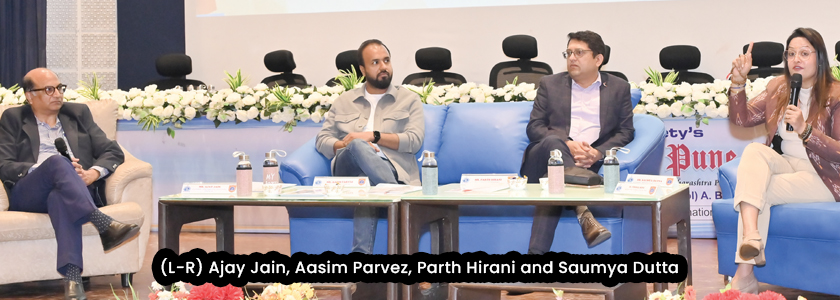
Panellists
Ajay Jain, Vice President - Global Supply Chain, Garware Fulflex India Pvt. Ltd.
Aasim Parvez, Founder and Chief Hustler, The Hustlers Middle East
Saumya Dutta, Vice President - HR Business Strategy, Goldstar Jewellery
Parth Hirani, Director, Jagdish Hirani & Associates
Nirmal Soni, Associate Professor, SBUP (Moderator)
Nirmal Soni: Since you (Aasim Parvez) are based in a global hub like Dubai, as an entrepreneur operating there, where do you see India in comparison to other countries in the future?
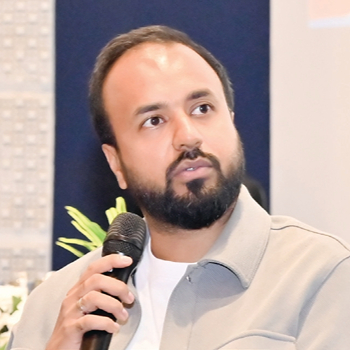
Aasim Parvez: India has its own advantages across industries. Specifically speaking about events and exhibitions, India has a huge potential. As Dubai is a global hub for trade, what usually happens is that everyone sees Dubai as a place where they can route their business. Dubai becomes a safe bet for anyone to do business or execute business from. The reason is that, in India there is too much diversity in terms of industries, people, and the way things function. While all this diversity contributes positively to the economy, at times it also works as a restriction, I would say this cannot stop us as a country from growing in this industry. We are getting better with time. So, in comparison, I would say Dubai provides a smoother gateway, but India is certainly on a path of strong growth.
"Despite global tariffs like the Trump tariffs, our industries are showing resilience, which is a very positive sign. From an outside perspective, India clearly looks like a nation with enormous untapped opportunities"
— Aasim Parvez
Q: Do Gulf Cooperation Council countries view us like Germany, USA, Russia or China? Are they gauging us as one of the powers in this multipolar world?
Aasim Parvez: From my understanding, the biggest power India has is its consumer power. If you look at any exhibition or event happening globally, the major participants or exhibitors are Indian companies—at least 40 percent or more. That is a huge number internationally. For example, in Germany, which is one of the biggest capitals for events, Indian companies dominate participation.
Even in the UAE, if you consider exhibitions or events, Indian companies remain the biggest contributors and exhibitors. So, when seen from a third-party perspective, Indian companies are consistently considered the first go-to approach. That, in itself, is a great reflection of our growing global recognition.
Q: As a consultant in international business (Parth Hirani), what are the key factors that clients consider while choosing an Indian firm or professional?
Parth Hirani: Technically there should not be any difference, but the reality is that perceptions matter. I work with various organisations across the globe, and often, the label or reputation one carries influences the type of business discussions that follow. The person may remain the same, but perception changes the engagement. In consulting, India has traditionally been seen as a country that serves rather than advises. So, when we speak of strategic advisory, especially in markets like the US, there is scepticism because the world has never seen India as a thought leader in strategy. Instead, India has always been recognised for service delivery. But, this does not mean we lack creative minds or innovation. What it really means is that we have never worked hard to change that identity. Serving is not wrong, but it should not define us endlessly. Outsourcing and cost arbitrage cannot remain our only identity.
Now, when clients choose consulting firms, they must reflect on their own objectives. Broadly, there are two types of consulting firms: one that brings its own unique methods and products, and the other that brings relevant experience. The real question is whether you want someone who has just worked for 20 years and claims expertise, or a firm that has structured processes tested across industries. Consulting is essentially about process. Firms should therefore be judged on how many cycles of that process they have completed successfully.
"Technology is a great tool, but sensibility, logic and rationality, must guide Gen Zs' decisions. They should be mindful that AI can support, but not replace their own judgment "
— Saumya Dutta
Q: Are we ready to rock the world with Gen Z in the workforce?
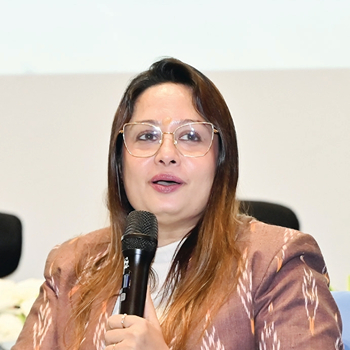
Saumya Dutta: Yes, absolutely. Gen Zs must understand that while sensitivity is important, what corporates truly expect is responsibility and practicality. After investing your time, your parents’ money, and your professors’ time in shaping you into future professionals, the expectation is that you step up as national citizens, entrepreneurs, and corporate leaders of tomorrow. So, what do we expect from them? First, their degrees should be up to the mark. Second, they must display an attitude of teamwork because all organisations work in teams. Third, the ability to listen is critical. And finally, most importantly, they must not be overly dependent on AI. Technology is a great tool, but sensibility, logic and rationality must guide their decisions. They should be mindful that AI can support, but not replace their own judgment.
Q: Are we comparatively ready? Do we have a competitive advantage to play our role globally?
Ajay Jain: Yes, I would say we are ready. Today, despite facing challenges like Trump tariffs, India is still growing. Manufacturing in India, is on the rise and global companies are actively looking to set up operations here. The China Plus One strategy is working in India’s favour. We have the resources, people and knowledge base. Of course, China is ahead of us right now, but over time, we will catch up. It may take us 20 years, but India will get there. Already, companies like Apple have started manufacturing in India, and many more are waiting in the wings.The government policies and incentives need to be streamlined, and once these align, no one can hold us back.
Q: How ready are we for global positioning? What are your views on India’s global footprint and the government policies in place?

Aasim Parvez: India undoubtedly has a huge potential. Policies are being framed with the right intent, but when it comes to ease of doing business, we are still behind many other countries like the UAE. For example, in Dubai, when you want to start a business, you simply walk into one office, get everything processed, and it is all transparent. That gives entrepreneurs confidence. In India, the policies exist, but processes can be slow and less transparent. Nevertheless, despite global tariffs like the Trump tariffs, our industries are showing resilience, which is a very positive sign. From an outside perspective, India clearly looks like a nation with enormous untapped opportunities.
Ajay Jain: I agree. India’s ranking in the ease of doing business index is still slow. From my experience, when we set up a factory in the Dominican Republic, it took us just one week to get all permissions and start operations. If India, can simplify its processes similarly, growth will be much faster. Schemes like Production Linked Initiative (PLI) scheme are encouraging, but they need refinement. If executed effectively, they can significantly boost industry growth and strengthen India’s global position.
"In consulting, India has traditionally been seen as a country that serves rather than advises. So, when we speak of strategic advisory, especially in markets like the US, there is scepticism because the world has never seen India as a thought leader in strategy"
— Parth Hirani
Q: How is exhibition marketing helping Indian companies enter markets such as Egypt and Libya?
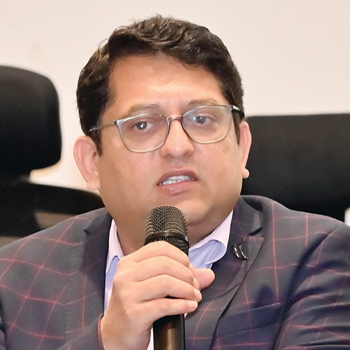
Aasim Parvez: Exhibition marketing has been a powerful tool for Indian companies to enter new markets. Take Saudi Arabia, for instance with Vision 2030, they are planning years ahead and investing heavily into diversification and futuristic industries. It is a tough market, but with the right positioning, opportunities exist. Comparatively, markets like Qatar or Bahrain are not as open to events and exhibitions because they still rely heavily on oil revenues. Dubai, however, is different. With limited oil reserves, it markets itself as a hub for trade, leisure, and tourism. It is one of the fastest adopters of AI globally, despite being a small country. This openness makes Dubai a perfect entry point, and exhibitions provide Indian firms with an effective way to showcase their strengths and tap into regional growth.
Q: Do you (Saumya) think that there are talent gaps? What are these talent gaps that today’s youth can address and be industry ready when the time comes?
Saumya Dutta: All of you must be aware of a simple fact that in a population of a billion in India, 960 million of us are in the age group of 15 to 64. And, because of this there is a whole plethora of equitable talent pools available. Now, what is it that sets you apart? Soft skills and software skills—the two crucial aspects of life. Now, talent is moving from being competitive to being collaborative with someone else.

Today, you may be an amazing talent in sales, but may be a little short on financial knowledge. First, get into a partnership with someone who knows that. And, once you have a partnership built with the person who knows finances, you are sorted. You are also co-partnering and creating a symbiotic environment where both flourish. It is not a parasitic environment. We have been encouraged to develop the parasitic environment. However, we have to create a symbiotic environment.
Second is, if you want to be irreplaceable, you have to constantly innovate yourself. Your image, your social media perception needs to be lucid. If you are seen at an employability scale, your social media footprints are also observed. So, in skill gap, managing your social media image is also a skill today. How you are looked at, how people are perceiving you through your LinkedIn or Instagram accounts—you're creating a perception there.
Third is imperative—what have you done to distinguish yourself to create the distinction from others; is one thing that sets you apart. So, the skills that you need to develop are soft skills, technological skills, manage your social media accounts.
And, fourth very important, keep innovating yourself. Your education does not stop with an MBA degree. You have to keep doing things beyond it, and it is a constant learning process. Don’t be polarised or opinionated. These are my few practical experiences.
"Today, despite facing challenges like Trump tariffs, India is still growing. Manufacturing in India is on the rise, and global companies are actively looking to set up operations here"
— Ajay Jain
Q: Share some trade secrets—how do you pitch, get an international client and crack the deal?
Parth Hirani: I see business as exchange of values. I give you a product that's a value to you. You gave me money, which is a value to me—it's simple exchange. In my opinion, sometimes we make things too complex unnecessarily. However, it is about how simply you can explain what you are doing.
If I see my success ratio, it's not very excellent. If I'm meeting with ten potential clients, I would be cracking maybe one or two deals out of them. I simply explain them what we do and what experience we have. There's another thing about our business that we can't even help everybody. At times, we sign on tangible values, we are a transformation company we would sign on a balance sheet, marking the period. Let's say, we agree with the tolerance percentage of 5 percent or 10 percent, and this is a period we help you reach at that tolerance level— that's a big selling point. Most consulting firm would not agree on that formal sign off and maybe aligning their fees with the same. Maybe the principles are same, but that shows our confidence on what we are bringing to the world.
Saumya Dutta: I have been part of the sales and I have been part of concept selling, where were used education as a tool. I've been a part of retail sales wherein we were selling merchandise. I have been part of telecommunication service. And, now I'm a part of luxury. So, I've seen four different industries along with four facets. Sales is nothing but storytelling, in a way wherein you are solving someone's problem. Now, when you are in the concept, selling the story line changes. For instance, when the Cadbury launched into the market, it was more in demand than sweets, due to its long shelf life. LG company did a study in India, in which they observed that from a joint family system Indians are coming to a nuclear family system, and based on that they launched a fridge of 165 litres in market—it was the biggest sales disaster because 200 litres was selling faster than 165 litres. Do you know the reason why? Because women started working, they prepared food for a week and needed more storage. And, that's how you solve a problem. So, sales is nothing, but solving problems.
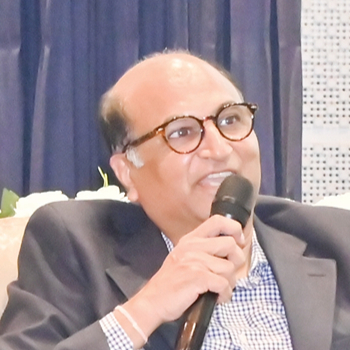
Ajay Jain: I wanted to add a little to her thought that storytelling is one of the aspect, but the most one according to me is perseverance. And one must continue to persevere.
Parth Hirani: On one side as a firm, we have luxury because we work on a different model. So, we cannot say no to projects. On another side, we are doing one of the largest project with a gentleman. I have pursued that gentleman for 10 years. Every month I used to send him a WhatsApp message, asking if we can meet—to spare 20 minutes because I wanted to work with him for a long run. While as a business we are doing really good, but I wanted that account in our profile. And, finally we cracked it.
So, what you highlighted in a conversation is really important. We need to chase our goals. Nobody's going to work for us—it's only us. And, many people say that it’s not happening. But, in life you only fail when you stop trying or when you stop playing. Till the time you are in the game, never conclude before finishing and decide whether you will fail or succeed, because that's also a game—keep playing, and keep getting better.
I want to add a few things on global arena as an individual. There are few things which I have seen and experienced at an early phase across the globe. I have seen many young Indians undergoing that—the perception we are given since childhood about superior and inferior complex. I've seen lot of Indians suffering from this mindset. You just need to be you, be natural. Talk to people, smile, greet them, invite them for dinner or lunch, everybody loves to socialise. For instance, I can't eat alone so I find somebody for company. Further, I don't like tiffin food because that's cold, hence I need to go to a restaurant. Now, that helped me because every lunch was a new meeting with someone I was socialising. So, be friendly and look at yourself as just a human. You have all the skills, you have all the knowledge, utilise it. Don't create your own mental barrier. This is one of the biggest things I have seen.
Second, I've seen skill gap in culture. Every culture has strengths and weaknesses. Though, I'm really proud of our culture, but we are bad planners. We don't like to plan and that actually gives us a lot of setback. We don't like to plan, rehearse and write. I have seen a major gap in areas where people are really hardworking and knowledgeable, but they don't take senior positions because they are bad planners and they don't know how to socialise.
Ajay Jain: Coming to the topic of India in the multipolar scenario, I would once again like to say that we are well poised. As long as we ensure that all our infrastructure and regulatory things are in place, we are going to have a super future for India in the next 10 to 15 years. India is growing, no one can stop us. Yes, tariffs are a blip maybe for a few months, but we had that earlier too. In the Covid-19 pandemic, we hit the rock bottom, but we emerged stronger and I think in this scenario India is going to be a leader very soon.
Aasim Parvez: Regarding sales I would like to share my perspective that you are marketing yourselves—regardless when you go for interviews you are marketing your skills and capabilities. You are convincing someone to hire you and that is marketing. If you start your career from sales you can switch anytime anywhere smoothly because the hardest thing is what you've cracked initially. Along with that, the events and exhibitions industry looks very glamorous from outside, but whoever is planning to get into that industry you need understand, what you see is only 10 per cent of what goes behind. The unseen work is 90 percent and the glamour part is just 10 percent. So, don't enter an industry based on what you see.